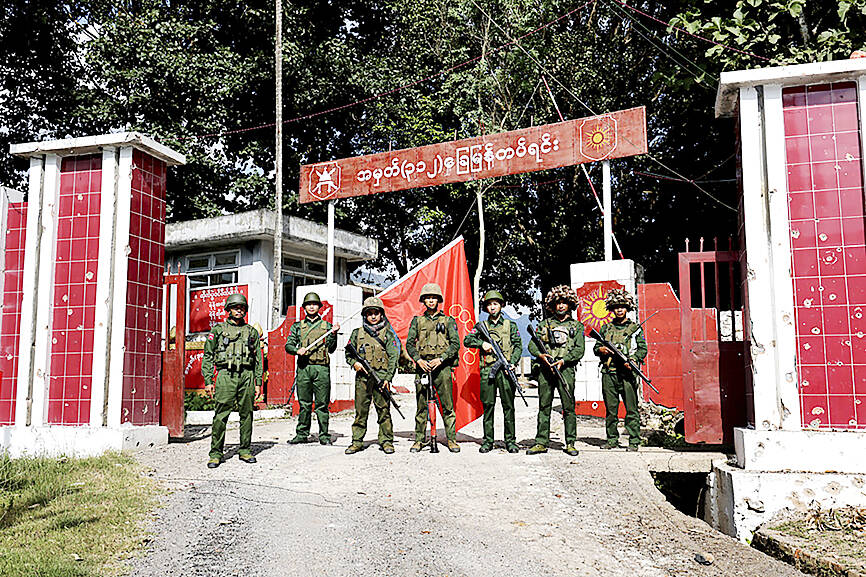Anti-junta fighters in Myanmar’s Chin state were aiming to gain control of part of a porous border with India, after tasting early success with the takeover of two military outposts on the remote mountainous frontier, a senior rebel commander said.
Dozens of rebels battled the Burmese military from dawn to dusk on Monday to overrun two camps abutting India’s Mizoram state, as part of a widening offensive against the junta, Chin National Front Vice Chairman Sui Khar said.
Spokespeople for the Burmese military and the Indian Ministry of Foreign Affairs did not immediately respond to requests for comment.

Photo: AP / Kokang online media
Myanmar’s generals are facing their biggest test since taking power in a 2021 coup after three ethnic minority forces launched a coordinated offensive late last month, capturing some towns and military posts.
The offensive, named by rebels as “Operation 1027” after the date it began, initially made inroads in junta-controlled areas on the border with China in Shan state, where military authorities have lost control of several towns and more than 100 security outposts.
“We are continuing our attacks in northern Shan State,” said Kyaw Naing, a spokesperson for the Myanmar National Democratic Alliance Army, which is part of the operation.
Fighting also erupted on two new fronts this week, in the western states of Rakhine and Chin, which sent thousands of people fleeing to Mizoram.
About 80 rebels mounted attacks on Rihkhawdar and Khawmawi military camps in Chin at about 4am on Monday, eventually taking control of both outposts after several hours of fighting, Sui Khar said.
Following the battle, 43 Burmese soldiers surrendered to Indian police and were sheltering in Mizoram, local police official Lalmalsawma Hnamte said.
“Whether they will be pushed back or not, we are waiting for further instructions from the central government,” he said.
Sui Khar and the Chin Human Rights Organization said they believed some of these soldiers might have been involved in atrocities against civilians.
Chin rebels would now look to consolidate their control along the India-Myanmar border, where the Burmese military has two more camps, Sui Khar said.
“We’ll move forward,” he said. “Our tactic is from the village to the town to the capital.”
Fighting was occurring across Rakhine state, said two residents and a spokesperson for the Arakan Army, a group fighting for greater autonomy that has seized military posts in Rathedaung and Minbya towns

MISINFORMATION: The generated content tends to adopt China’s official stance, such as ‘Taiwan is currently governed by the Chinese central government,’ the NSB said Five China-developed artificial intelligence (AI) language models exhibit cybersecurity risks and content biases, an inspection conducted by the National Security Bureau (NSB) showed. The five AI tools are: DeepSeek, Doubao (豆包), Yiyan (文心一言), Tongyi (通義千問) and Yuanbao (騰訊元寶), the bureau said, advising people to remain vigilant to protect personal data privacy and corporate business secrets. The NSB said it, in accordance with the National Intelligence Services Act (國家情報工作法), has reviewed international cybersecurity reports and intelligence, and coordinated with the Ministry of Justice Investigation Bureau and the National Police Agency’s Criminal Investigation Bureau to conduct an inspection of China-made AI language

LIMITS: While China increases military pressure on Taiwan and expands its use of cognitive warfare, it is unwilling to target tech supply chains, the report said US and Taiwan military officials have warned that the Chinese People’s Liberation Army (PLA) could implement a blockade within “a matter of hours” and need only “minimal conversion time” prior to an attack on Taiwan, a report released on Tuesday by the US Senate’s China Economic and Security Review Commission said. “While there is no indication that China is planning an imminent attack, the United States and its allies and partners can no longer assume that a Taiwan contingency is a distant possibility for which they would have ample time to prepare,” it said. The commission made the comments in its annual

CHECKING BOUNDARIES: China wants to disrupt solidarity among democracies and test their red lines, but it is instead pushing nations to become more united, an expert said The US Department of State on Friday expressed deep concern over a Chinese public security agency’s investigation into Legislator Puma Shen (沈伯洋) for “secession.” “China’s actions threaten free speech and erode norms that have underpinned the cross-strait ‘status quo’ for decades,” a US Department of State spokesperson said. The Chongqing Municipal Public Security Bureau late last month listed Shen as “wanted” and launched an investigation into alleged “secession-related” criminal activities, including his founding of the Kuma Academy, a civil defense organization that prepares people for an invasion by China. The spokesperson said that the US was “deeply concerned” about the bureau investigating Shen

‘TROUBLEMAKER’: Most countries believe that it is China — rather than Taiwan — that is undermining regional peace and stability with its coercive tactics, the president said China should restrain itself and refrain from being a troublemaker that sabotages peace and stability in the Indo-Pacific region, President William Lai (賴清德) said yesterday. Lai made the remarks after China Coast Guard vessels sailed into disputed waters off the Senkaku Islands — known as the Diaoyutai Islands (釣魚台) in Taiwan — following a remark Japanese Prime Minister Sanae Takaichi made regarding Taiwan. Takaichi during a parliamentary session on Nov. 7 said that a “Taiwan contingency” involving a Chinese naval blockade could qualify as a “survival-threatening situation” for Japan, and trigger Tokyo’s deployment of its military for defense. Asked about the escalating tensions